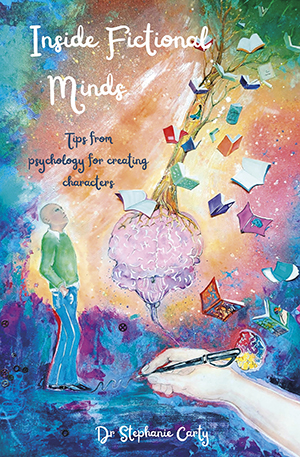 I don’t know about you, but I often find ‘how to’ books a little hard to digest. Rules can be particularly off-putting when it comes to creative acts such as writing fiction.
I don’t know about you, but I often find ‘how to’ books a little hard to digest. Rules can be particularly off-putting when it comes to creative acts such as writing fiction.
With Inside Fictional Minds, Dr Stephanie Carty overcomes those barriers with ease. A light, hearty tone delivers psychological insights that will help you to regard your protagonist, and, let’s face it, yourself, afresh.
The book falls into three sections: The Basics, The Specifics and Putting It All Together. As Carty writes in the introduction: “The first section will cover a wide range of topics about how characters (well, humans… but let’s keep saying characters) feel, think and interact.”
Through exploring the fundamental beliefs, relationships and perceptions that inform behaviour, alongside exercises that place your characters in settings beyond the story world you’ve created for them, Carty equips us to view our created people with dazzling clarity and to unpick the complex myriad of experiences that have shaped them. Even if these moments happen off-page and aren’t mentioned within the story itself, through identifying these influences and their impacts, Carty furnishes us to build three-dimensional characters whose responses to the plot will be as richly nuanced as any real person’s.
“Why are they drawn to bad relationships, why do they say yes when they mean no, why do they pretend they’re ok when they’re struggling, why do they hurt the people they care about?”
Carty guides us through the process of imbuing their background with a history of pattern-forming and reinforcement that ensures they are not only believable, flawed individuals, but allows us to trust our subconscious in writing their choices as the story progresses.
Throughout, Carty’s tasks and questions keep us on track. In ‘Overview of Emotions’, she asks: “Could a reader label these specific emotions in your character accurately without them being named in the story?” and suggests we see if a beta reader comes up with something different. It’s an excellent way to test your writing for pesky holes, while empowering you to make every scene and development fully watertight.
Carty’s psychological training offers a reassuring shimmer of authority as she walks us through the many aspects of personality formation, such as learning what is and isn’t acceptable according to the society we’re brought up in (and therefore what we need to mask) and the ways emotions can appear in other guises, such as the anger that becomes weepiness.
Carty also urges us to consider how we “show what an anxious, hypervigilant mind would notice in specific scenes”, and how a loss that impacts “your character’s core identity” could reveal itself on the page.
Deeper into the guide we uncover the importance of balancing angel/devil desires, and how early attachment relationships shape a person.
Thinking habits, such as confirmation bias and the halo effect, also play their role, while an examination of why your character relies on particularly coping strategies, and how they might break free of these, all have the potential to add up to a deliciously complicated hero or villain.
Carty’s succinct and friendly prose keep the deluge of information on the right side of intrigue, while making it easy to absorb and put into practice.
You may find you are already addressing some points subliminally. I found it unexpectedly invigorating to learn to scrutinise character and world-building, with each underlying lynchpin enabling you anticipate and understand character actions and reactions.
From the physiological signals to psychological deflections to deep rooted default behaviours, it’s clear that even the protagonist of the smallest micro fiction could benefit from an unwritten backstory to imbue them with authenticity and emotional resonance.
This book contains all the tricks, tools and exercises to make every character three-dimensional, and help you fathom the hidden depths of ‘real world’ people as well.
Inside Fictional Minds by Dr Stephanie Carty is published by AdHoc Fiction. Buy your copy.
This book was given to me in exchange for a fair review.
Seen or read anything interesting recently? I’d love to know. I’m always happy to receive reviews of books, art, theatre and film. To submit or suggest a review, please send an email to judydarley (at) iCloud.com. Likewise, if you’ve published or produced something you’d like me to review, please get in touch.
